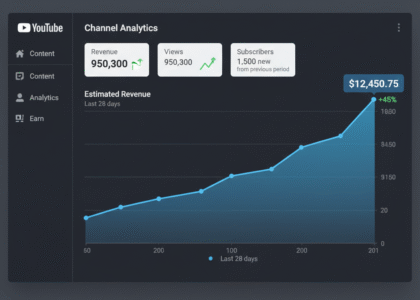What if I told you that your financial success has less to do with how much you earn and more to do with how you think about money? Your money mindset—the way you perceive and approach money—plays a crucial role in your financial well-being.
Many people believe that wealth is only for the lucky or privileged, but the truth is that financial success often starts with the right mindset. If you constantly feel stuck in a cycle of financial struggle, it might be time to rethink how you view money.
In this article, we’ll explore the impact of your financial mindset, how it shapes your money decisions, and practical steps to transform your thinking for long-term financial success.
Understanding the Money Mindset

What is a Money Mindset?
A money mindset refers to the set of beliefs and attitudes you hold about money. It influences how you earn, save, spend, and invest.
For example, do you see money as a tool for freedom or a constant source of stress? Do you believe you can build wealth, or do you think financial success is out of reach? Your answers to these questions reveal a lot about your money mindsets.
Fixed vs. Growth Financial Mindset
- A fixed money mindset believes that financial status is predetermined. People with this mindset often think, “I’ll never be rich,” or “I’m just bad with money.”
- A growth money mindset believes that financial skills can be learned and improved over time. These individuals are open to learning, taking risks, and adapting their financial strategies.
Your financial future isn’t set in stone—your mindset can change, and so can your wealth.
Signs of a Poor Money Mindset
Are you unknowingly holding yourself back financially? Here are some red flags that indicate a negative money mindset:
- Fear of Investing – Avoiding investments due to fear of losing money.
- Living Paycheck to Paycheck – Struggling to save despite earning enough.
- Negative Money Beliefs – Thinking “money is evil” or “rich people are greedy.”
- Avoiding Financial Planning – Ignoring budgets, debt, and long-term goals.
If any of these sound familiar, don’t worry—mindset shifts can help break these patterns.
Shifting from a Scarcity to an Abundance Mindset
Scarcity vs. Abundance Thinking: Money Mindset
- Scarcity mindset – Focuses on lack, believing money is hard to come by.
- Abundance mindset – Sees opportunities to earn, grow, and build wealth.
How to Develop an Abundance Mindset
- Change Your Language – Replace “I can’t afford it” with “How can I afford it?”
- Educate Yourself – Read books, listen to finance podcasts, and learn from successful people.
- Practice Gratitude – Focus on what you have instead of what you lack.
- Take Smart Risks – Start investing, take on side projects, or learn new income-generating skills.
Many self-made millionaires started by shifting from a scarcity to an abundance mindset—so can you!
Practical Steps to Improve Your Money Mindset

1. Set Clear Financial Goals
Define short-term and long-term financial objectives. Clarity helps create motivation.
2. Surround Yourself with Financially Smart People
Join communities, network with mentors, or follow finance experts.
3. Track and Automate Finances
Use apps to track spending, automate savings, and set investment contributions.
Investing with the Right Mindset
Many people fear investing because they associate it with risk. However, the real risk is not investing and letting inflation eat away at your savings.
Beginner Investment Strategies
- Start Small – Begin with index funds or ETFs.
- Think Long-Term – Focus on growth over time instead of quick wins.
- Diversify – Spread investments to reduce risk.
FAQs
1. What is a money mindset, and why does it matter?
A money mindset is your attitude and beliefs about money. It affects how you earn, save, and invest.
2. How can I shift from a scarcity to an abundance mindset?
Change your perspective, educate yourself, and surround yourself with financially successful people.
4. What are simple habits to build wealth over time?
Automating savings, tracking expenses, and investing regularly are key habits.
5. How does my mindset affect my ability to invest?
A growth mindset helps overcome fear and encourages smart, long-term investing decisions.
Final Thoughts
Your money mindset can either hold you back or propel you toward financial success. By shifting from a scarcity mindset to an abundance mindset, setting clear goals, and making intentional financial choices, you can change your financial future.
Start today—adopt a mindset that attracts wealth and financial freedom!






